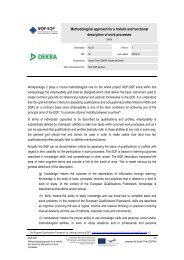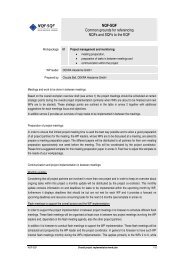Overview of National Qualification frameworks - Project-Nqf-Sqf
Overview of National Qualification frameworks - Project-Nqf-Sqf
Overview of National Qualification frameworks - Project-Nqf-Sqf
Create successful ePaper yourself
Turn your PDF publications into a flip-book with our unique Google optimized e-Paper software.
The Malta <strong>Qualification</strong>s Council (MQC) is the <strong>National</strong> Contact Point (NCP) <strong>of</strong> the Malta<strong>Qualification</strong>s Framework (MQF) and the European <strong>Qualification</strong>s Framework for LifelongLearning. Consultation meetings and events leading to the launching <strong>of</strong> the Malta ReferencingReport (2007-2009) led to the engagement <strong>of</strong> all stakeholders in the referencing process.Within the Malta <strong>Qualification</strong>s Council there is a department which focuses on the recognition <strong>of</strong>foreign qualifications. The Malta <strong>Qualification</strong> Recognition Information Centre (MQRIC)which is a member <strong>of</strong> the NARIC-ENIC Network has a standard procedure to verify the quality<strong>of</strong> foreign qualifications which may or may not be <strong>of</strong>fered in Malta. The MQRIC Officerscheck that the awarding institution is accredited, that the particular qualification is alsoaccredited and check whether the qualification is level rated. Most <strong>of</strong> the foreign qualificationsoriginate in the United Kingdom therefore the QCF Level is translated to the EQF Level andtherefore to the MQF Level. There are however a number <strong>of</strong> sectoral qualifications which areaccredited and internationally recognised but they are not level rated to the EQF. If thequalifications are awarded by institutions outside the United Kingdom, the MQRIC Officersrefer to the NARIC-ENIC counterparts for information about institutions and specifically aboutqualifications. If qualifications are accredited by the country <strong>of</strong> origin and benefit from mutualrecognition, these are level rated to the MQF and the EQF through a formal protocol betweenMQC and the education and training provider representing the foreign awarding body. Over6000 qualifications are processed through this Office every year.__ What, if any, legal regulations and measures/mechanisms/tools/methods/practices existwithin the formal education and training system for easing access to education abroad?Please describe those briefly.Foreign awarding bodies are widely represented in Malta, so learners do not have to travel abroad toachieve a foreign qualification. Education and Training providers have to be <strong>of</strong>ficially licensed bythe Ministry <strong>of</strong> Education, Employment and the Family.The University <strong>of</strong> Malta (1592) was one <strong>of</strong> the first Universities in Europe to introduce theEuropean Credit System (ECTS) across all its faculties and centres with a few exceptions. Thetransparency <strong>of</strong> ECTS credits very much promoted by the Bologna Process not only gives studentsopportunities for Erasmus exchanges but also to study abroad following completion <strong>of</strong> their studiesin Malta.Although ECVET is in its early stages in the local institutions and there are no programmes such asthe ERASMUS for higher education students, opportunities for apprenticeship overseas do exist forVET students.Since the launching <strong>of</strong> the MQF in 2007 qualifications that are used as benchmarks in the MQFgive a transparent value and visibility to qualifications thus enhancing mobility <strong>of</strong> students.The Government <strong>of</strong> Malta awards the following sponsorship schemes to encourage mobility <strong>of</strong>students:(a) Malta Government Scholarship Scheme (MGSS) – targets undergraduate and post-graduatestudents;(b) Strategic Educational Pathways Scholarships (STEPS) – targets post-graduate students only(c) Malta Arts Scholarships (MAS) – targeting students with any level <strong>of</strong> studies.__ What, if any, legal regulations and measures/mechanisms/tools/methods/practices exist foraccessing learning outcomes from non-formal/informal learning? e.g.:Page 3/3




